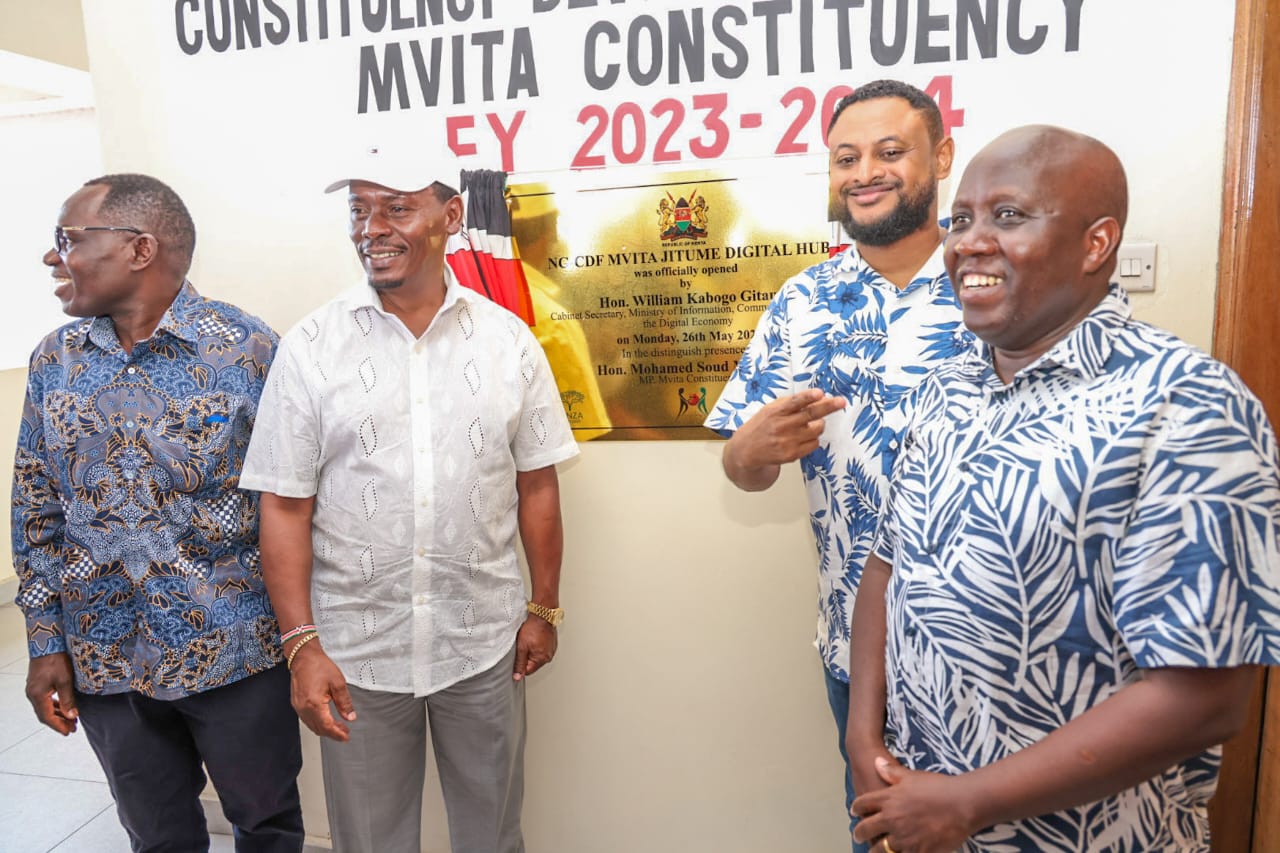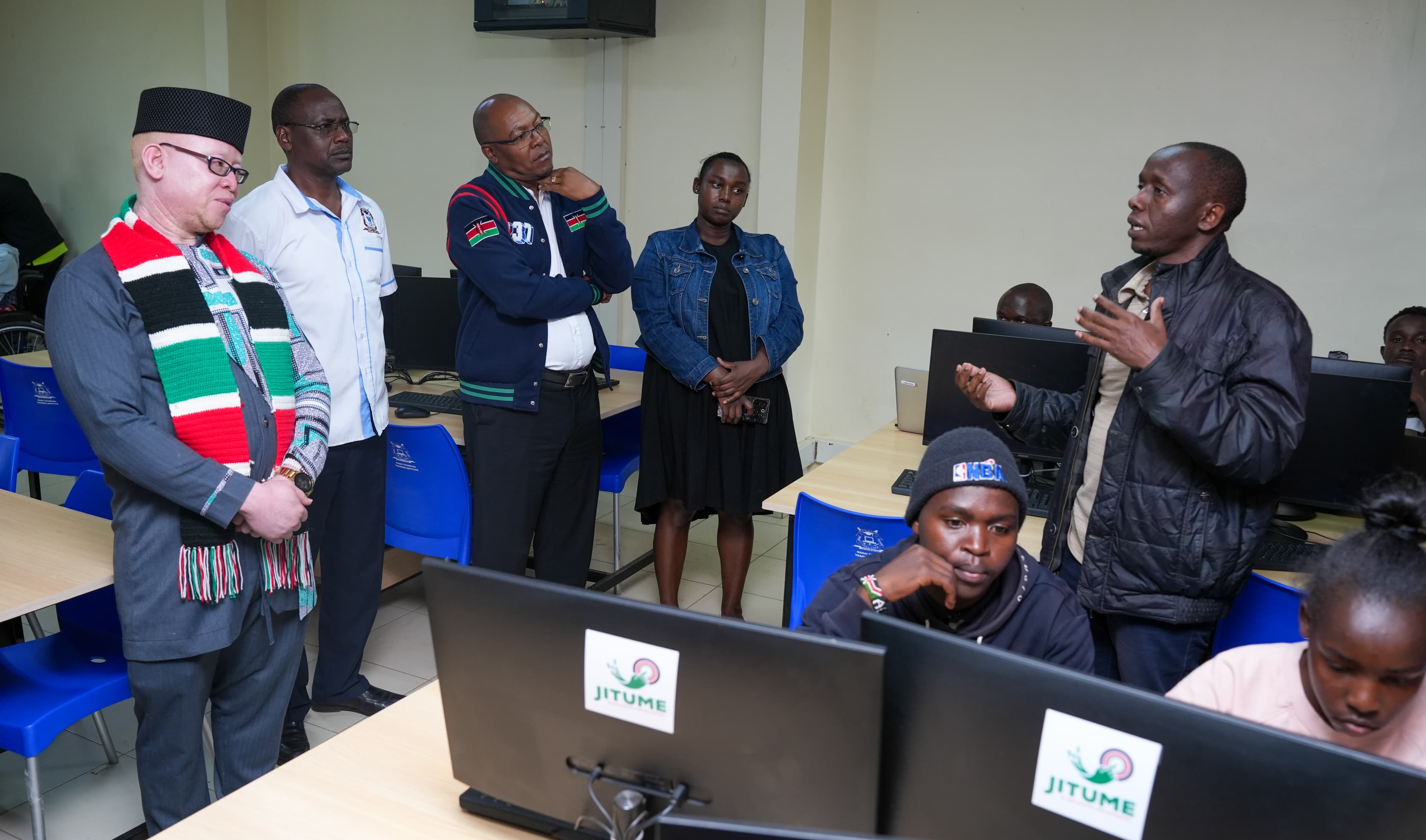 Cabinet Secretary for Information
Communications and Digital Economy, William Kabogo (donning
a White cap), accompanied by Principal Secretary State
Department for Broadcasting and Telecommunications Stephen Isaboke (left),
Mvita Member of Parliament, Machele Mohamed (2nd right) and the
Principal Secretary, State Department for ICT John Tanui (Extreme
left), during the launch of Jitume digital hub in Mvita Constituency. (Photo
by Beverlin Musili).
Cabinet Secretary for Information
Communications and Digital Economy, William Kabogo (donning
a White cap), accompanied by Principal Secretary State
Department for Broadcasting and Telecommunications Stephen Isaboke (left),
Mvita Member of Parliament, Machele Mohamed (2nd right) and the
Principal Secretary, State Department for ICT John Tanui (Extreme
left), during the launch of Jitume digital hub in Mvita Constituency. (Photo
by Beverlin Musili).
A gateway to opportunities for the youth, Jitume Digital Hubs are turning out to be not mere cyber units but vital, utile facilities as they serve as springboards to youth empowerment.
By providing access to digital resources and training the hubs are genuinely empowering young people to become innovators, entrepreneurs, and leaders in the digital economy.
Under the Digital Superhighway and Creative Economy Pillar of the Bottom-up Economic Transformation Agenda (BETA), the country is successfully on the course of achieving universal broadband availability across the regions with construction of Fibre Optic backbone connectivity increasing from 8,900 Kilometres in 2022 to 13,590 Kilometres in 2025.
The government’s broadband scaling has effectively powered the Jitume hubs, subsequently reshaping Kenya’s digital landscape and empowering thousands of youths with market-relevant skills, eventually linking them to online job opportunities.
Launched in December 2022, the program has established over 282 digital hubs countrywide, benefiting 36,987 young Kenyans.
Out of this number, 13,153 have completed enhanced digital skilling lessons under the Ajira program ran by the Government in collaboration with development partners.
 Government Spokesperson Dr. Isaac Mwaura (extreme Left) and his Deputy, Mr. Gabriel Muthuma, (3rd Left) listen to a digital skilling tutor at the Masai National Polytechnic Jitume Hub during a media tour to the institution. (Photo by Mathew Gwendo).
Government Spokesperson Dr. Isaac Mwaura (extreme Left) and his Deputy, Mr. Gabriel Muthuma, (3rd Left) listen to a digital skilling tutor at the Masai National Polytechnic Jitume Hub during a media tour to the institution. (Photo by Mathew Gwendo).
Cabinet Secretary for Information, Communications and the Digital Economy, Mr. William Kabogo says the Government is not only pursuing development but also a positive change hence the escalated empowerment of the youth digitally.
“The government is pursuing development and positive change. We are committed to ensuring that President William Ruto’s vision to empower Kenyans through broadband connectivity and digital skilling is fully realised,” said CS Kabogo as he launched the NG-CDF Mvita Jitume Digital Hub in Mombasa recently.
The launch coincided with the hub’s trainee’s graduation ceremony, over which the CS presided and lauded the facility’s high youth turnout that saw 248 trainees complete a one-month skilling program.
The Jitume initiative, spearheaded by Kabogo’s ministry, aims to provide youth with access to digital services, skills and opportunities.
It is designed to bridge the digital
divide and foster job creation through technology.
Earlier, during a similar launch of a Jitume Digital Hub at the Tana River Technical and Vocational College, President Ruto had emphasized on the initiative's role in economic transformation and inclusive prosperity for Kenyans.
“The initiative is a crucial step toward achieving our vision of a Kenya that values dignity,” said the Head of State.
The hubs, located primarily in TVET institutions and community centres, are equipped with high-speed internet, modern computers and interactive learning tools.
They offer free access to digital resources, allowing the youth to pursue certifications, attend virtual classes and explore remote work opportunities.
Government Spokesperson Dr. Isaac Mwaura notes that the youth are enhancing their academic performance, exploring online work, launching small businesses and creating content through access to digital tools provided by the Government.
“Some have begun supporting their education through freelancing and e-commerce, while others leverage AI tools to boost their learning,” the Spokesperson adds.
The government, Dr. Mwaura says, plans to expand the Jitume hubs in all 1,450 wards by 2027 and introduce specialised training tracks in coding, digital marketing, cybersecurity, and artificial intelligence.
These enhancements are expected to boost Kenya’s competitiveness in the global digital economy, he adds, in line with the Kenya Kwanza administration’s Bottom-Up Economic Transformation Agenda (BETA) under the Digital Economy pillar.
His deputy Mr. Gabriel Muthuma who heads the New Media division of the Office of the Government Spokesperson, emphasizes on the program’s role in rural empowerment saying, “more than just tech spaces, the hubs foster collaboration, mentorship and inclusive innovation.”
“We are witnessing a digital revolution that is inclusive and far-reaching. These hubs are not just about computers and the internet; they are about hope, opportunity and economic empowerment,” Muthuma says.
The youth are proving that talent exists in every corner of Kenya and all they need, is access,” says Mr. Muthuma as he reaffirms the government’s commitment to scaling digital access and skills across the country.
The program’s success stories flowing
from all corners of the country are a reflection of the growing confidence and
independence the youth are gaining through digital empowerment, proving that
with access and opportunity, no one is left behind.
The writer, Elsie Wanyoike, works at the Office of Government Spokesperson.








